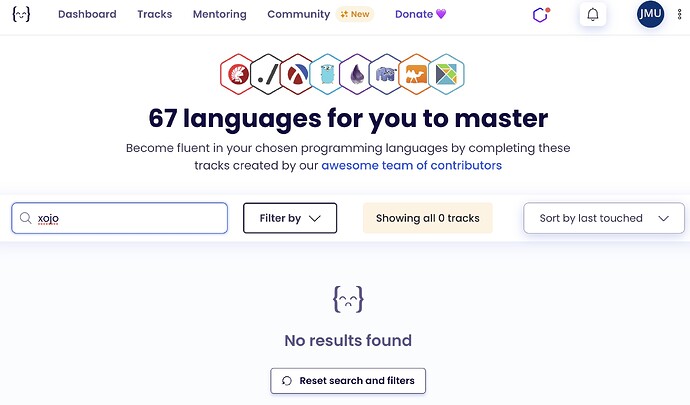I hope some HTML educators will join the crowd.
The first sentence had me in stitches;
“ Xojo is the the best kept secret of developers around the world”
Agreed, an optimisation is easy:
Xojo, the diamond for all bug lovers, is the the best kept secret of developers in the entire universe.

But it is very true. https://exercism.org/ for instance doesn’t know Xojo ![]()
An ironic line to use in a marketing piece. ![]()
The Dr. Ed Lindoo, Regis Univeristy is legit, BUT it was previous to Api2 and Web2 so at this time you can say it was an opinion for another product.
The other 3 opinions look made up
In Europe, no-one will ever get a job because of Xojo skills. Nobody outside that nano-sized Xojo community knows what it is. Where are the job adverts that ask for Xojo skills? I have seen none in more than a year. Why should educators lead their students to this dead end?
Learning to code and learning to code for a job are two very different goals in my mind. For many students at university, learning to code is awfully hard and they’ll never do it again after that class - in that case Xojo is a fairly easy/low stress language/IDE and it’ll teach them them the basics of coding. If you’re going to University to learn a job skill then Xojo’s not a good choice, IMO.
My daughter was using Xojo at 9 years old. She just graduated with her Masters in CS and hasn’t used Xojo in maybe 7 or 8 years so using Xojo to springboard into other languages is certainly doable. Her preferred languages are Python and Rust but probably has done non-school coding in an additional dozen languages.
The target audience was never the full stack developer used to Java, C++ or C. It was always the older VB Developer used to VB6 and the VB dotnet developer. I can’t see and I also don’t know anybody of the entire people using Xojo I met being educated or trained of self trained for one of the major languages and earning their money with Xojo. There are a hand full of people but they left mostly.
So where is the change in the audience? Possibly it is now so that Xojo left the Image of a professional Environment for professional users. But I can’t even think that for example an Insurance, an automotive company or a company like SAP or oracle ever would use Xojo for their main tools. And it is also not so.
Looking on the audience there is also another fact you can see looking on the community. The users are not becoming younger. While in Java Forums for example more and more young developers taking place in Xojo environment there is not really a big amount <25. Looking on Java, C++, C, Python, C#: there is.
Thinking why it is so brings me to the point: because it is not from interest to learn basic language but one of the major programming languages. That is good to understand while people want to earn money with their skills. And with Xojo skills you can’t earn much money.
In one of the Java forums for example we have a job thread where programmers can find jobs and also requests for consultants and you can see also big companies looking there for employees like Siemens, General Electric and many more.
Something what will never happened in Xojo environment. That is one of the big problems. While there is no need for this skills on the market the language is not from interest for young people. Because people can’t choose the tool to use: the company tells you what wo use.
So there is more than one factor to drive Xojo away from full stack developers Edge. Sad? Not really, Xojo was never a real full stack developer IDE. Looking on Eclipse, Netbeans and Visual Studio and also Jbuilder I can say: the IDE of Xojo was outdated before 15 years. And not only since yesterday. The code completion is a pain. The Debugger is a horrible thing. Comparing to Eclipse or Netbeans you may find out fast: the Xojo world has nothing to do with modern IDE. The concept of Netbeans is as old as Xojo is. The Eclipse IDE also.
we may have to accept that the Xojo world is not growing and was never as big as for example the Java world or the C++ world. It may be a nice niche software. But it is what it is: not a high-end professional programmers tool. Java for example but also C++. They are coming up with threads since the beginning of the language. It is, let me say, the normal world of Java programming to work with threads, for example to prevent from blocking the UI.
And that is only one outdated feature. It is an old language. The idea behind Xojo is great. No question. Everybody is able to learn the basic language and while so many dangerous functionality is far away from the users they can’t even burn their fingers. I prefer to be able to have Threads and to have all the new technologies around. AI for example. A ChatGPT client for Java is there. But for Xojo?
And all this fancy stuff in the ecosystems of the major languages. It is not comparable what you get buying a Xojo license. But. if you are a citizen Developer you have with this language a simple tool. Without shooting in the knees, without burning the fingers. But with workarounds and a documentation which has nothing to do with that what for example a Java Developer would call a documentation.
There is a wide way to learn Xojo. But learning Java costs triple amount. It is not simple. Not trivial. And C++, C# and other languages also not.
It could be so nice for citizen devs and they would have a great perspective ion they would try to get it to a better situation. I hope that they find out early enough that it is needed. Especially for the citizen devx. They are the needed customers for Xojo.
Agree, for course like ‘Basic programming for biology students’ Xojo may be an acceptable choice.
From my own experience as a Chemist I know that a number of these students start with a flavour of Basic and outgrow it within a year.
As a chemistry major, when I was in school (back in the stone age) the only coding i was required to do in a chemistry course was in a course named “Principles Of Electronic Instrumentation”… Back then they assumed that at some point you would need to build your own instruments so had us do a bit of 6502 assembler!
My calculus course back then required us to learn some BASIC to do numerical integration, and as an elective I took a Fortran course… Of course that was back when one coded on a keypunch! ![]()
Are there really courses these days like “Coding For Biology Majors?” I work with people from a Bio background and I can’t imagine anyone of them doing any coding!
-Karen
I know at some universities the ‘intro to programming’ course gives math credit. So rather than take calculus the business majors (and other non-tech degrees) take the programming class. At my university the architects took it rather than the Calc II class.
When I was in school (the stone ages) I was a camera operator for online classes and learned SQL through the business class I was working. I scoffed at the time because SQL was so…verbose and the rules seemed a little loosy goosy instead of the tight requirements of a traditional programming language. How little did I know it would become part of my every day life many years later.
Part of my diploma thesis work was developing a program for capturing data from a test apparatus and driving the test sequence (linear heating). It was done on an Atari ST. The machine was clocked at 8 MHz and data polling was done in a loop I had to code in assembler in order get it squeezed into the time slice available for one pass. We hand-counted the processor cycles consumed by the routine. I started as a complete noob (no programming courses for scientists then, no Internet), bought some books about programming and algorithms and learned a lot. It was the stone age of IT and it was a great time with lots of fun!
Similarly, when FoxPro (or was it FoxBase Plus) started allowing embedded SQL as well as passing SQL queries to external databases, I too scoffed. I was skeptical that my hand-optimized DML via the Fox dialect of XBase could be bested consistently by a set-based language and optimizer. I did not understand that the optimizer under the hood, code-named Rushmore, would be so good that it would eventually be incorporated into Sql Server. It gradually won me over. And now that XBase is dead there are no real alternatives anyway.
I am probably in a similar evolution with lamda syntax (e.g., Linq for Sql) but the bar is a little higher. There are endless articles about how to choose one of the available Linq query approaches that will not translate to inefficient SQL. If you have to think carefully about that, IMO you might as well “think in SQL” directly to begin with. I am almost convinced to favor Linq for querying / filtering in-memory structures like lists, because even when it’s a bit slower, the syntax CAN be more concise and even self-evident despite all the cryptic => and other symbols. However … for talking to DBs, not so much.
You have no idea how much I miss those days. ![]()
I have an Atari ST with a whopping 20 meg HD set up in my basement that I play with every once a while.
Man. Aren’t we all a bunch of old farts? ![]()
I had an Atari-ST to and wrote a program for it to process data from a gamma counter at work… And they bought one for the company!
I used to do radiolabeling and it took care off all the decay calculations and product stocking an expiration date paperwork for the radioactive products we made in my department and worked off a database with the information needed for all our products.
-Karen
yepp… my very first PC from 1988 is still working today ![]()
2 years ago I’ve made a streaming live-session in getting old system to run. FreeGEM is still existing today and I have to say, it looks very nicely. (Screenshots here)
My fav back in those time was Geoworks Ensemble, far more better advanced than Windows3 but well… Microsoft gagged their OEMs and Vendors and the rest is history…

